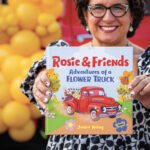 A white dog, dripping blood, came into the Humane Society of the Harrisburg Area as a cruelty case.
A white dog, dripping blood, came into the Humane Society of the Harrisburg Area as a cruelty case.
Living in a backyard, he got loose just before his scheduled surrender to the society. While on the run, he was shot in the face. Coincidentally, his name was Bullet.
“He came in dripping blood, but wagging his tail a mile a minute,” said Elysa Springer, a shelter volunteer. “He had a great personality.”
That was 2010. During his recovery, including two surgeries, Bullet was fostered then officially adopted by Springer and her husband Patrick Noll, who serves as the Humane Society’s director of programs, as well as humane officer for Dauphin, Cumberland and Perry counties. The Hummelstown couple aptly renamed Bullet, “Bulletproof.”
“A lot of dogs—that would have beat their spirit,” Noll said. “But he was so happy.”
Still friendly and full of personality at age 10, Bulletproof is now a certified therapy dog that often visits patients at the Penn State Hershey Rehabilitation Hospital. He knows about scars as well as second chances; his face still bears the mark of the gunshot.
Today, his distinctive visage is also the face of a local holiday drive collecting donations to benefit area animals during the holiday season—but with a deeper purpose of helping people overcome their fear of pit bulls and pit bull breeds, often called “pitties” by some, but “monster breeds” by others.
That’s right. Bulletproof is a pit bull mix. Does that affect your view of his story? Springer wants to help change that.
This is the fourth year that she has organized the Harrisburg area’s “Monster Holiday Drive” as part of the nationwide “I’m Not a Monster Holiday Drive.” In 2017, Springer’s efforts netted more than $3,300 worth of donated goods, split between two organizations—the Humane Society and Pitties.Love.Peace., a nonprofit rescue dedicated to pit bulls based in Elizabethtown.
Nationwide, the drive collected more than $870,000 worth of supplies and donations benefiting 125 animal shelters and rescues. Each local chapter features an “elf,” or ambassador pit bull, with his or her story featured on the advocacy initiative’s national website.
Springer invites donations of crates, tough toys and chews such as Kongs, gently used blankets, peanut butter, gift cards and many additional items. Items and area businesses with collection bins are listed on the “Bulletproof the Therapy Dog” Facebook page.
Springer, accompanied by Bulletproof, in a holiday costume, traditionally round up all donations and deliver them on New Year’s Day.
“It’s a huge help, and it eases the financial burden on supplies,” said Jessica Blouch, vice president of Pitties.Love.Peace. “Plus, it’s great to give the dogs something of their own.”
The organization, founded in 2011, fosters about 45 pit bulls at any one time through a network of area foster families. Most dogs are rescued from local shelters or surrendered by owners. To date, the organization has placed close to 1,000 pitties in forever homes.
“We’ve rescued dogs that have been attacked by other dogs, animal cruelty cases, dogs covered in burns, with fractures, broken legs, dogs that were abused, dumped or neglected,” Blouch said. “Unfortunately, it’s the dogs that get labeled, not the humans who did the damage.”
Great Pets
The official name of the breed is the American Pit Bull Terrier, but Noll said that many mixed-breed dogs are lumped under the pit bull label based upon appearance and guesswork. He said the breed is high-energy, muscular and characterized by a bulky head. It’s not aggressive like many people believe, yet often stubborn and “almost always friendly.”
“I never feared for my life in a pit bull situation,” Noll said, of his nearly 15 years at the Humane Society. “The only time I was ever bitten by a dog was by a Corgi.”
At any one time, the Humane Society is home to well over 300 animals, about 100 of which are dogs. Noll conservatively estimated the percentage of pit bull mixes at any given time at the shelter at 60 percent.
“The biggest problem [leading to overpopulation], in my opinion, is backyard breeding,” Noll said.
Compounding the problem, the adoption rate is much lower for pitties.
Noll said that many people avoid adopting them, even if they’re aware of the falsehoods, because they don’t want to deal with the hassles associated with the stigmas. For instance, some landlords forbid tenants from owning pit bulls. Springer said that people regularly cross the street when she walks Bulletproof or other pitties, deliberately avoiding them or fearful.
“The biggest misconception is that people think they’re mean,” Springer said. “So, they label them as monsters.”
Bulletproof is one of five dogs in Noll and Springer’s household. All but one are pit bull mixes, and they all hail from dire situations of cruelty or neglect. The couple said that their dogs are proof that animals from bad situations, even pit bulls, can make great pets.
“My whole family came from the shelter,” Springer said. “Seeing all the animals in the shelter at the holidays that don’t have families, that’s rough for me.”
She sees Monster Holiday Drive donations as tangible proof that generous people do indeed care about homeless shelter dogs, even pit bulls.
“Nothing makes me happier,” she said.
For more information, see the Facebook page: Bulletproof the Therapy Dog. Elysa Springer invites people with questions about donations or locations to message her through the Facebook page. Also visit monsterholidaydrive.com, humanesocietyhbg.org and pittieslovepeace.com.





